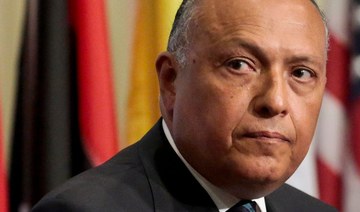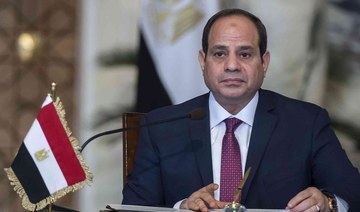PARIS: World powers on Friday told Libya to stick to a plan for holding presidential elections on December 24, adding that foreign mercenaries should also leave and allow the country to turn a page in its history.
French President Emmanuel Macron hosted leaders and diplomats in Paris for an international conference, declaring that Libya was now as a “crossroads” that would determine its future.
The North African country has been mired in civil war since the overthrow of dictator Muammar Qaddafi in a 2011 uprising, with the bloodshed drawing in competing Libyan factions and extremist groups, as well as regional powers.
The presidential vote on December 24 is the core part of a United Nations plan to help restore stability, but the calendar has been under pressure as tensions flare once more between rival camps.
“We urge all Libyan stakeholders and candidates to respect their commitments toward holding elections on 24 December 2021 (and) to accept the results of free, fair and inclusive elections,” the powers said in a statement after the talks.
The scheduling has remained unclear, after Libya’s parliament in early October pushed back legislative elections until January.
“Libya is once again at a crossroads. There have been 10 years of disorder and upheaval in which the international community is not without responsibility,” said Macron.
“The next six weeks will be decisive,” he added.
The world powers also warned that sanctions could be imposed against anyone deemed to be impeding the process.
“We affirm that individuals or entities, inside or outside of Libya, who might attempt to obstruct, undermine, manipulate or falsify the electoral process and the political transition will be held accountable and may be designated” by UN sanctions, their statement said.
Key players attending the meeting included US Vice President Kamala Harris and Egyptian President Abdel Fattah El-Sisi, one of Paris’s closest allies in the Middle East.
German Chancellor Angela Merkel and Italian Prime Minister Mario Draghi were also present. But President Recep Tayyip Erdogan of Turkey and Russian President Vladimir Putin were conspicuous by their absence.
Libya was represented by transitional presidential council head Mohamed Al-Menfi as well as Prime Minister Abdelhamid Dbeibah who said: “Concrete guarantees must be obtained that the election results will be accepted and that those who reject them will be sanctioned.”
Earlier this week, Libya opened registration for election candidates, with speculation mounting over possible presidential bids by eastern strongman Khalifa Haftar or even Qaddafi’s son Seif Al-Islam, both deeply divisive figures.
The conference to endorse a plan for the departure of all foreign forces and mercenaries from Libya, with the statement giving “full support for the comprehensive Action Plan for the withdrawal of mercenaries, foreign fighters and foreign forces from the Libyan territory.”
Turkey had sent in troops as well as pro-Ankara militia units from Syria to shore up the Tripoli government.
Observers also accuse Moscow of deploying mercenaries belonging to the Wagner group, which is allegedly controlled by a close ally of Putin.
Pro-Haftar forces said in a statement ahead of the conference that 300 foreign mercenaries fighting on their side would leave the country, “at the request of France.”
The nationality of the fighters was not specified and no timeline was given. The UN estimates that 20,000 mercenaries and foreign fighters are deployed in Libya.
“The mercenary withdrawal plan must be implemented. Russia and Turkey must withdraw their mercenaries without delay,” Macron said, welcoming the announcement that 300 mercenaries would leave as a “first step.”
“This is only the beginning, but it is an essential beginning which finally gives credibility to a process that we have been talking about for too long,” said Macron.
France has faced accusations of backing the pro-Moscow and staunchly secular Haftar but has always insisted it has been fully objective in the conflict.
Merkel commented that Turkey had “reservations” about the process of withdrawing mercenaries.
But she added: “It’s a good thing that we can see a first withdrawal, it will serve as an example. Things have started.”
Powers urge Libya to keep poll plan, want mercenaries out
https://arab.news/6xspw
Powers urge Libya to keep poll plan, want mercenaries out
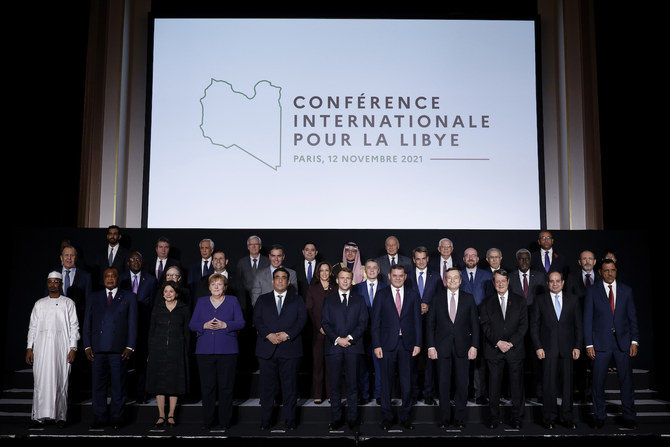
- Friday’s conference is co-chaired by France, Germany, Italy, Libya, and the United Nations
- A leading rights group questioned Thursday whether Libyan authorities can hold free and fair elections
Oil tanker hit by missile off Yemen: security firm
“A Panama-flagged crude oil tanker was reportedly ‘attacked’” about 10 nautical miles southwest of Mokha, Ambrey said, adding that information “indicated the vessel was hit by a missile and that there was a fire in the steering gear flat.”
The British navy’s maritime security agency had earlier said it received a report of a vessel “sustaining slight damage after being struck by an unknown object.”
“The vessel and crew are safe and continuing to its next port of call,” United Kingdom Maritime Trade Operations (UKMTO) added.
It said the incident occurred 76 nautical miles (140 kilometers) off Yemen’s Hodeidah, without specifying the type of vessel involved.
The Iran-backed Houthi rebels, who control much of Yemen, have launched dozens of attacks on vessels in and around the Red Sea since November in a campaign they say is in solidarity with Palestinians in war-torn Gaza.
The rebel attacks have prompted reprisal strikes by US and British forces and the formation of an international coalition to protect the vital shipping lanes through the Gulf of Aden and the Red Sea.
Israeli forces kill senior Palestinian militant in Jenin: army

- The strike by a fighter jet and helicopter killed Islam Khamayseh
- Khamayseh was a leader of the Jenin Battalion
RAMALLAH: The Israeli military said on Saturday it killed a senior Palestinian militant during an air strike on an “operations center” in the occupied West Bank city of Jenin.
“A number of significant terrorists were inside the compound,” the Israeli Defense Forces said in a statement posted to Telegram.
It said the strike by a fighter jet and helicopter killed Islam Khamayseh, a “senior terrorist operative in the Jenin Camp” who was responsible for a series of attacks in the area.
The Al-Quds Brigade, the armed wing of militant group Palestinian Islamic Jihad, confirmed in a statement that Khamayseh was killed and several others wounded during an Israeli raid on Friday night.
It said Khamayseh was a leader of the Jenin Battalion, which is affiliated with Islamic Jihad.
The Palestinian Ministry of Health said one person was killed and eight were wounded and receiving hospital treatment as a result of Israel’s operation in Jenin on Friday night.
Israel has occupied the West Bank since 1967 and its troops routinely carry out incursions into areas such as Jenin, which are nominally under the Palestinian Authority’s security control.
The West Bank has seen a recent surge in violence, particularly since the Israel-Hamas war erupted on October 7.
More than 500 Palestinians have been killed by Israeli forces or settlers across the West Bank since October 7, according to Palestinian officials, and at least 20 Israelis have been killed over the same period, according to an AFP tally based on official Israeli figures.
The Gaza Strip has been at war since Hamas’s unprecedented attack on October 7 resulted in the deaths of more than 1,170 people in Israel, most of them civilians, according to an AFP tally based on official Israeli figures.
Israel’s retaliatory offensive on the Hamas-ruled Gaza Strip has killed at least 35,303 people, most of them civilians, according to the Hamas-run territory’s health ministry.
Fierce fighting in northern Gaza as aid starts to roll off US-built pier

- Residents say Israeli bulldozers demolishing homes, shops in Jabalia
- Hamas says US floating aid pier no substitute for end to Israeli siege
CAIRO: Israeli forces battled Hamas fighters in the narrow alleyways of Jabalia in northern Gaza on Friday in some of the fiercest engagements since they returned to the area a week ago, while in the south militants attacked tanks massing around Rafah.
Residents said Israeli armor had thrust as far as the market at the heart of Jabalia, the largest of Gaza’s eight historic refugee camps, and that bulldozers were demolishing homes and shops in the path of the advance.
“Tanks and planes are wiping out residential districts and markets, shops, restaurants, everything. It is all happening before the one-eyed world,” Ayman Rajab, a resident of western Jabalia, said via a chat app.
Israel had said its forces cleared Jabalia months earlier in the Gaza war, triggered by the deadly Hamas-led attacks on southern Israel on Oct. 7, but said last week it was returning to prevent Islamist militants re-grouping there.
In southern Gaza bordering Egypt, thick smoke rose over Rafah, where an escalating Israeli assault has sent hundreds of thousands of people fleeing from what was one of the few remaining places of refuge.
“People are terrified and they’re trying to get away,” Jens Laerke, UN humanitarian office spokesperson, said in Geneva, adding that most were following orders to move north toward the coast but that there were no safe routes or destinations.
As the fighting raged, the US military said trucks started moving aid ashore from a temporary pier, the first to reach the besieged enclave by sea in weeks.
The World Food Programme, which expects food, water, shelter and medical supplies to arrive through the floating dock, said the aid was transported to its warehouses in Deir Al Balah in central Gaza and told partners it was ready for distribution.
The United Nations earlier reiterated that truck convoys by land — disrupted this month by the assault on Rafah — were still the most efficient way of getting aid in.
“To stave off the horrors of famine, we must use the fastest and most obvious route to reach the people of Gaza – and for that, we need access by land now,” deputy UN spokesperson Farhan Haq said.
US aid was arriving in Cyprus for delivery to Gaza via the new pier, Washington said.
Hamas demanded an end to Israel’s siege and accused Washington of complicity with an Israeli policy of “starvation and blockade.”
The White House said US national security adviser Jake Sullivan would visit Israel on Sunday and stress the need for a targeted offensive against Hamas militants rather than a full-scale assault on Rafah.
A group of US medical workers left the Gaza Strip after getting stuck at the hospital where they were providing care, the White House said.
Humanitarian fears
The Israel Defense Forces said troops killed more than 60 militants in Jabalia in recent days and located a weapons warehouse in a “divisional-level offensive.”
A divisional operation would typically involve several brigades of thousands of troops each, making it one of the biggest of the war.
“The 7th Brigade’s fire control center directed dozens of airstrikes, eliminated terrorists and destroyed terrorist infrastructure,” the IDF said.
At least 35,303 Palestinians have now been killed, according to figures from the enclave’s health ministry, while aid agencies have warned repeatedly of widespread hunger and dire shortages of fuel and medical supplies.
Israel says it must capture Rafah to destroy Hamas and ensure the country’s safety. In the Hamas attack on Oct. 7, 1,200 people died in Israel and 253 were taken hostage, according to Israeli tallies. About 128 hostages are still being held in Gaza.
Israel said on Friday that its forces retrieved the bodies of three people killed at the Nova music festival in Israel on Oct. 7 and taken into Gaza.
In response, Hamas said negotiations were the only way for Israel to retrieve hostages alive: “The enemy will not get its prisoners except as lifeless corpses or through an honorable exchange deal for our people and our resistance.”
Talks on a ceasefire have been at an impasse.
‘Tragic war’
Israeli tanks and warplanes bombarded parts of Rafah on Friday, while the armed wings of Hamas and Islamic Jihad said they fired anti-tank missiles and mortars at forces massing to the east, southeast and inside the Rafah border crossing with Egypt.
UNRWA, the main UN aid agency for Palestinians, said more than 630,000 people had fled Rafah since the offensive began on May 6.
“They’re moving to areas where there is no water — we’ve got to truck it in — and people aren’t getting enough food,” Sam Rose, director of planning at UNRWA, told Reuters on Friday by telephone from Rafah, where he said it was eerily quiet.
At the International Court of Justice, or World Court, in The Hague, where South Africa has accused Israel of violating the Genocide Convention, Israeli Justice Ministry official Gilad Noam defended the operation.
The South African legal team, which set out its case for fresh emergency measures the previous day, framed the Israeli military operation as part of a genocidal plan aimed at bringing about the destruction of the Palestinian people.
Fierce fighting in northern Gaza as aid starts to roll off US-built pier

- Residents say Israeli bulldozers demolishing homes and shops in Jabalia in the path of the advance
- Hamas says US floating aid pier is no substitute for end of Israeli siege of Gaza
CAIRO: Israeli forces battled Hamas fighters in the narrow alleyways of Jabalia in northern Gaza on Friday in some of the fiercest engagements since they returned to the area a week ago, while in the south militants attacked tanks massing around Rafah.
Residents said Israeli armor had thrust as far as the market at the heart of Jabalia, the largest of Gaza’s eight historic refugee camps, and that bulldozers were demolishing homes and shops in the path of the advance.
“Tanks and planes are wiping out residential districts and markets, shops, restaurants, everything. It is all happening before the one-eyed world,” Ayman Rajab, a resident of western Jabalia, said via a chat app.
Israel had said its forces cleared Jabalia months earlier in the Gaza war, triggered by the deadly Hamas-led attacks on southern Israel on Oct. 7, but said last week it was returning to prevent Islamist militants re-grouping there.
In southern Gaza bordering Egypt, thick smoke rose over Rafah, where an escalating Israeli assault has sent hundreds of thousands of people fleeing from what was one of the few remaining places of refuge.
“People are terrified and they’re trying to get away,” Jens Laerke, UN humanitarian office spokesperson, said in Geneva, adding that most were following orders to move north toward the coast but that there were no safe routes or destinations.
As the fighting raged, the US military said trucks started moving aid ashore from a temporary pier, the first to reach the besieged enclave by sea in weeks.
The World Food Programme, which expects food, water, shelter and medical supplies to arrive through the floating dock, said the aid was transported to its warehouses in Deir Al Balah in central Gaza and told partners it was ready for distribution.
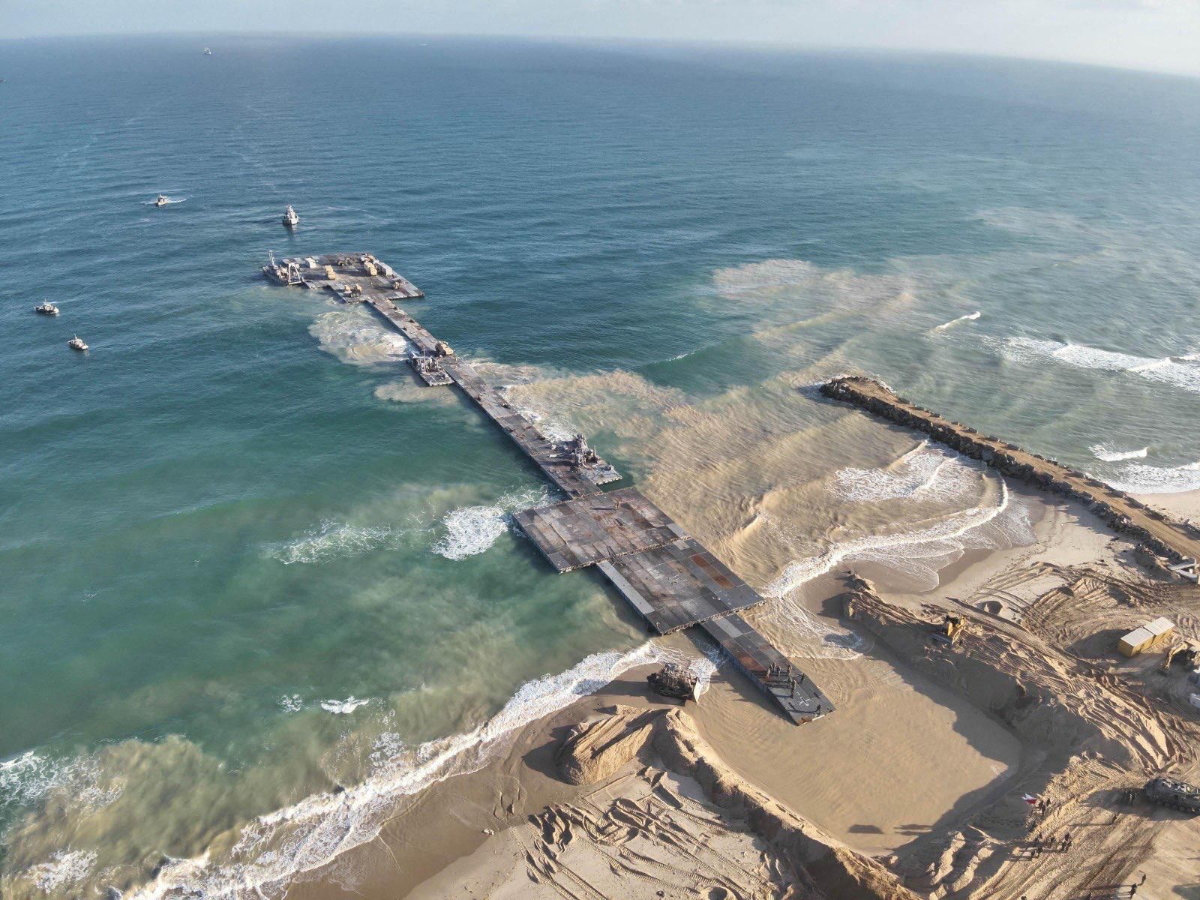
The United Nations earlier reiterated that truck convoys by land — disrupted this month by the assault on Rafah — were still the most efficient way of getting aid in.
“To stave off the horrors of famine, we must use the fastest and most obvious route to reach the people of Gaza – and for that, we need access by land now,” deputy UN spokesperson Farhan Haq said.
US aid was arriving in Cyprus for delivery to Gaza via the new pier, Washington said.
Hamas demanded an end to Israel’s siege and accused Washington of complicity with an Israeli policy of “starvation and blockade.”
The White House said US national security adviser Jake Sullivan would visit Israel on Sunday and stress the need for a targeted offensive against Hamas militants rather than a full-scale assault on Rafah.
A group of US medical workers left the Gaza Strip after getting stuck at the hospital where they were providing care, the White House said.
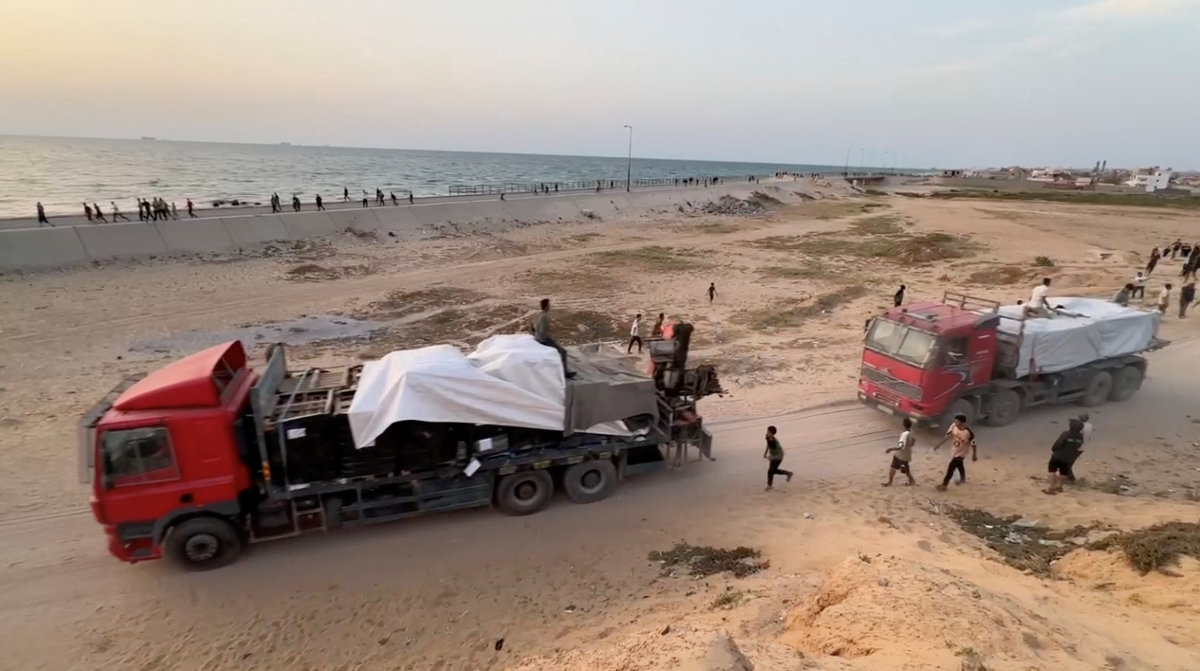
Humanitarian fears
The Israel Defense Forces said troops killed more than 60 militants in Jabalia in recent days and located a weapons warehouse in a “divisional-level offensive.”
A divisional operation would typically involve several brigades of thousands of troops each, making it one of the biggest of the war.
“The 7th Brigade’s fire control center directed dozens of airstrikes, eliminated terrorists and destroyed terrorist infrastructure,” the IDF said.
At least 35,303 Palestinians have now been killed, according to figures from the enclave’s health ministry, while aid agencies have warned repeatedly of widespread hunger and dire shortages of fuel and medical supplies.
Israel says it must capture Rafah to destroy Hamas and ensure the country’s safety. In the Hamas attack on Oct. 7, 1,200 people died in Israel and 253 were taken hostage, according to Israeli tallies. About 128 hostages are still being held in Gaza.
Israel said on Friday that its forces retrieved the bodies of three people killed at the Nova music festival in Israel on Oct. 7 and taken into Gaza.
In response, Hamas said negotiations were the only way for Israel to retrieve hostages alive: “The enemy will not get its prisoners except as lifeless corpses or through an honorable exchange deal for our people and our resistance.”
Talks on a ceasefire have been at an impasse.
’Tragic war’
Israeli tanks and warplanes bombarded parts of Rafah on Friday, while the armed wings of Hamas and Islamic Jihad said they fired anti-tank missiles and mortars at forces massing to the east, southeast and inside the Rafah border crossing with Egypt.
UNRWA, the main UN aid agency for Palestinians, said more than 630,000 people had fled Rafah since the offensive began on May 6.
“They’re moving to areas where there is no water — we’ve got to truck it in — and people aren’t getting enough food,” Sam Rose, director of planning at UNRWA, told Reuters on Friday by telephone from Rafah, where he said it was eerily quiet.
At the International Court of Justice, or World Court, in The Hague, where South Africa has accused Israel of violating the Genocide Convention, Israeli Justice Ministry official Gilad Noam defended the operation.
The South African legal team, which set out its case for fresh emergency measures the previous day, framed the Israeli military operation as part of a genocidal plan aimed at bringing about the destruction of the Palestinian people.
WHO says no medical supplies received in Gaza for 10 days

GENEVA: The World Health Organization said Friday that it has received no medical supplies in the Gaza Strip for 10 days as Israel pursues a new offensive against Hamas.
Israel’s closure of the Rafah crossing into Gaza has caused “a difficult situation,” WHO spokesman Tarik Jasarevic said. “The last medical supplies that we got in Gaza was before May 6.”
Israeli troops entered the city of Rafah on May 7 to extend their offensive against Hamas over the militant group’s attacks seven months earlier. They closed the Rafah crossing into Egypt that is crucial for humanitarian supplies.
With UN agencies warning of a growing risk of famine in Gaza, the Kerem Shalom and Erez crossings from Israel are also virtually shut down.
Jasarevic said the biggest concern was over fuel needed to keep clinics and hospitals running. Gaza’s health facilities need up to 1.8 million liters of fuel a month to keep operating.
The spokesman said only 159,000 liters had entered Rafah since the border closure. “This is clearly not sufficient,” he added, highlighting how only 13 out of 36 hospitals across the Palestinian territory were now “partially” operating.
“Hospitals still functioning are running out of fuel, and that puts so many lives at danger,” said Jasarevic. “Current military operations in Rafah are putting countless lives at risk.”
The Hamas attack on October 7 resulted in the death of more than 1,170 people in Israel, most of them civilians, according to an AFP tally based on official Israeli figures. Out of 252 people taken hostage, 128 are still held inside Gaza, but the army says 38 have died.
More than 35,300 people, mostly civilians, have been killed in the Palestinian territory since the war broke out, according to data provided by the health ministry of Hamas-run Gaza.



